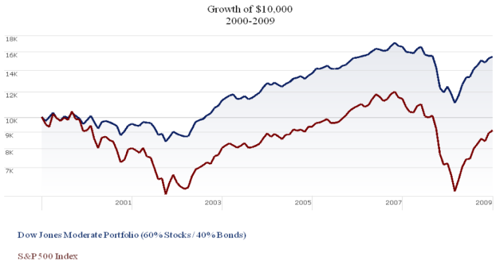State of the Markets
State of the Markets
January 29, 2010 by Lesjak Planning
Well, it’s official…this past decade has been dubbed “The Lost Decade.” As measured by the S & P 500’s anemic negative .95% average annual return, the past ten years have performed the worst since at least the early 1800’s.
High quality active managed funds outperformed the indexes by a wide margin over the same period. Asset allocation that included bonds since 2000 performed even better yet.
Has the anemic decade that gave us two major 40% plus declines in equities ended for good? The record setting last nine months of 2009 certainly would lead one to believe that the economy must be heading back to the boom times. Not so fast! As the President’s State of the Union speech made clear, there are still important issues that need to be addressed to declare this recession over.
While it is clear that housing inventories are down and corporate revenues are beating estimates to the upside, credit availability and jobs need to improve as well. The administration’s reinvigorated push on the jobs issue is welcomed by small businesses that are struggling to obtain credit for expansion and restocking inventory levels. Without this, owners are very leery to commit to bringing workers back full time.
It is common for the initial market surge from its lows to be lead by companies that fell the hardest in the decline and are not that strong financially. The second part of the market advance is typically lead by money flowing into companies with strong balance sheets, abundant cash, and good revenues. We believe that shift will take place this time as well. The most recent declines may be the beginning of that shift.
Diversification is imperative going forward to be both positioned for the next advance and also for protection in the intermittent declines. The gradual strengthening of this economy coupled with the vast amounts of cash still in very low interest bearing accounts bodes well for investing in equities in the years to come.
These periods of uncertainty should elicit caution, but not the abandonment of your long term planning.

Recently, the stock market climb has been interrupted quite dramatically by the uncertainty of the administration’s desire to tax or re-regulate the banks and financial institutions.
In our opinion, this doesn’t appear to be headhunting, but more of a return to the restrictions that were eased by congress over the past decade or so. Those restrictions, including the Glass-Steagall Act, were put in place after the depression to separate the savings banks from investment banking activities. When these were repealed and relaxed, the mega mergers between banks and investment companies happened overnight. The result was almost another depression. Our elected officials obviously caved to pressure from the financial companies and forgot the mantra: If you don’t learn from history, you’re bound to repeat it!
Equity markets don’t like uncertainty and it seems that we will need to get through this period until some direction is clear. The economy is making progress. Interest rates, as stated by the Federal Reserve in their meeting this week, should stay low for the foreseeable future. Also, as banks balance sheets continue to strengthen, we should see credit ease further and jobs come back slowly but steadily.












































About the author
Lesjak Planning